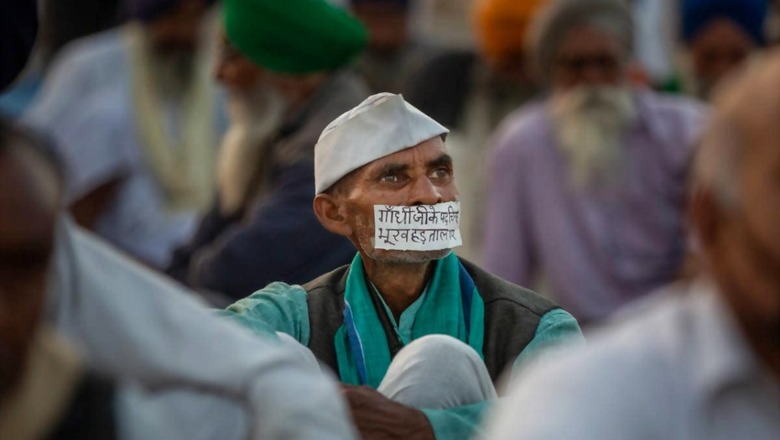
views
How many of us have seen tomatoes, chillis, cabbages, onions or several other mouth-watering and nutritionally dense fresh produce dumped on state highways for them to be run over by the brute force of moving heavy vehicles? I believe most of us. Yet, we looked the other way on this form of protest, despair, anger and price management that farmers across the country, not just in one state or two, have been displaying for decades.
Prabhu Pingali (along with Aiyar, Abraham and Rahman, 2019) in his critically acclaimed book ‘Transforming Food Systems for a Rising India’ emphasizes how the key to development of modern agri-food sector lies in ‘reducing transaction costs, developing and improving market infrastructure and limiting the influence of intermediaries’.
Prof. Pingali, one of the greatest global agricultural economists of our times, currently heading the Tata-Cornell initiative and a former Chief Economist at United Nations Food and Agricultural Organization (UN-FAO), on the basis of experiences cutting across time and national boundaries, prescribes that since ‘markets in India are mostly unorganized with limited infrastructure limiting their ability to cater to quality requirements and specifications…(there is a need to develop alongside traditional markets), direct linkages with farms and alternative markets based on electronic sales platforms, new commodity futures and warehousing systems’.
What is the evidence that engaging in alternate markets with features such as contract farming directly or through producer organizations, bypassing traditional APMC mandis, will help farmers? This is a valid concern, but should fear and apprehension drive decisions or should evidence?
In a recent publication in one of the leading global academic journals, World Development, Prof. Vinish Kathuria of IIT Bombay and a Mahalanobis Medal winner (along with Bhanot and Das), study ‘the role of institutional innovations in agri-marketing channels in addressing the issue of distress selling’ of tomatoes in Maharashtra. Based on real-time data and simulations, they ‘find that opting to sell through alternative marketing channels’ such as Contract Farming (CF) and Farmer Producer Companies (FPCs) ‘helps farmers minimize losses and shields them from distress selling’.
The authors state that, ‘By design, the CF and FPC institutions reduce the multiple intermediaries, thereby reducing the transaction costs for the small farmers…. (and) the assured price offered under Contract Farming protects them against losses in the event of downward spiral in spot-market prices. Likewise, assured savings in cultivation cost and collective marketing through FPC improve the farmer?s bargaining power, thereby fetching a better price for their produce.’
Not only academic, but anecdotal and case specific evidence is plentiful globally. However, to focus closer home, a Harvard Case Study on Mir Khuram, the apple entrepreneur in Jammu and Kashmir, showed how farmers gained on an average 20-24 percentage points of the share in final consumer price by engaging with Khuram’s firm HN Agri-Serve that connected Kashmiri apple growers directly to markets in rest of India. Researchers from IIM Bangalore via an in-depth case study showed how banana farmers’ share of consumer price went up from 28% to 42% when supplying to large modern fresh retail directly. Not only that, wastages in supply chains reduced from 30% to 15%.
Sadly, the storm of misinformation clouds the common sense that the Indian Farm Reforms 2020 – The Farmers? Produce Trade and Commerce (Promotion and Facilitation) Act, the Farmers (Empowerment and Protection) Agreement on Price Assurance and Farm Services Act, and the Essential Commodities (Amendment) Act – are simply like Wankhede stadium authorities ensuring the pitch conditions are perfect and favor Indian players, that boundaries are defined, and that rules are set. This does not guarantee either the victory or loss of the Indian team. It is only meant to ensure fair play. The outcome will still largely depend on how our players perform that day and if the umpire adjudicates well or not.
Hence, the discussion should not be about whether we need ‘fair-play’ conditions or not – i.e. the Farm Reforms Acts – but how to ensure public and private buyers make the relational and infrastructure investments required to ensure farmers trust the buyers enough to enter into long standing mutually beneficial business.
While there is not even a mention of removal of price support (such as MSPs) in the reform Acts, it has to be understood that they should remain the safety net it is meant to be, and not become a walking stick for the lame. For farmers to actually bypass APMCs or traditional mandis, a law allowing that notwithstanding, it will require that market buyers work closely with farmers – either directly or via FPCs – by helping them with precise inputs, state-of-the art farm practices, timely credit, certifications, grading and sorting facilities, value added for rejected or low quality produce.
For instance, rather than rejecting low grade bananas causing pain and loss to the farmer, it can buy low grade bananas for the dried banana snacks market or for selling as base ingredient in nutraceuticals. The buyers (or the ‘Sponsors’ as the Act calls them) need to have a skin-in-the-game in farm sector development, and not treat farmers as a transactional party. If this happens, there is ample encouraging evidence to show that farmers will surprise everyone by stepping up their game. In fact, like cricketers, farmers too need a Sponsor, not charity.
Read all the Latest News, Breaking News and Coronavirus News here
















Comments
0 comment